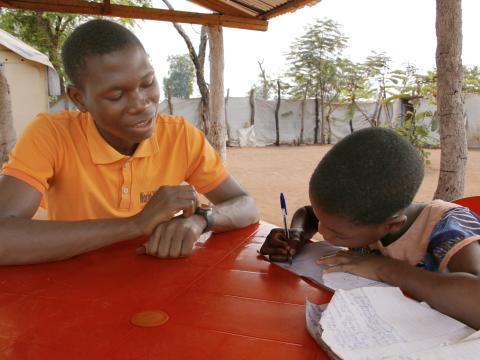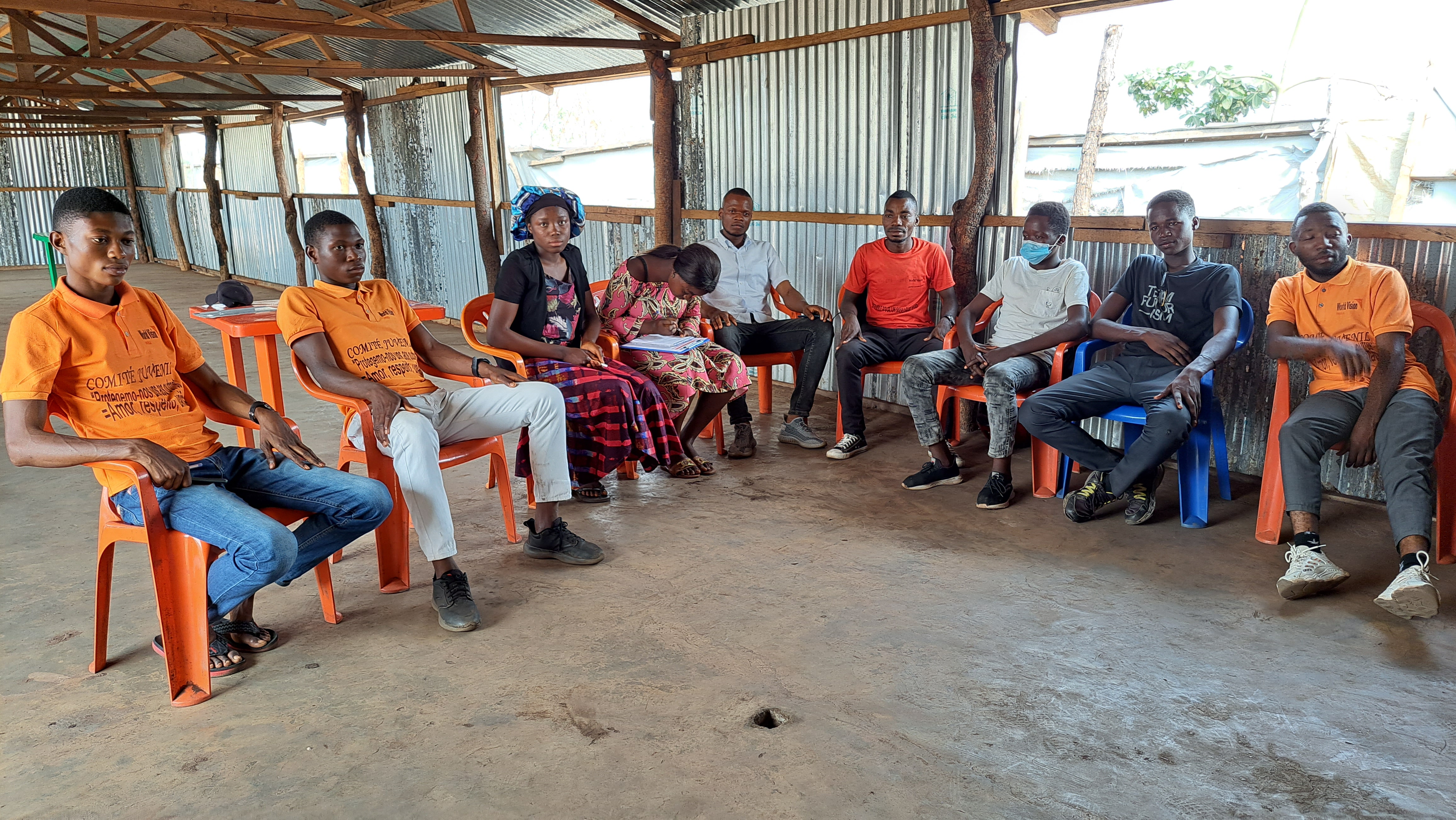From despair to hope - The life transformation of a young refugee in Angola

David is a 19-year-old young man with a broad, peaceful smile. Among his friends, he has chosen to be called Musankishayi, which means "joy" in his native Tshiluba language, as a way of expressing what he seeks in his future: happiness.
Claire, aged 9, is David's sister and is a shy girl. She has few words, but a deep, observant gaze, and her visible scars tell a story of the struggle for life.
The two are survivors of a massacre that took place seven years ago in the village where they lived with their parents and brother, in the Kasai region of the Democratic Republic of Congo (DRC). Since then, they have been refugees in the settlement of Lóvua, in the province of Lunda Norte in Angola, on the border with the DRC.
As the violence escalated and became increasingly imminent, their family didn't have time to organise themselves to flee. David and Claire, aged 13 and 2 at the time, had to witness horrors that no human being, let alone children, should ever endure.
That fateful morning, their parents were kidnapped by the rebel militia and cruelly murdered. Their older brother, traumatised by the situation, was hospitalised in a state of shock. David managed to recover some money that his mother had collected as a street vendor, which was used to buy the last of the milk to feed his sister, who was still small, during the moments of tension and uncertainty.
"Claire was hungry, and I found where Mum hid the money. I managed to escape and get some milk so she could hold out a little longer," the young man recalled.
David and Claire's saga of the struggle for survival would begin at that moment.
At night, David and Claire were hiding in a neighbor's house when it was attacked and set on fire. David, in a desperate bid to save his sister, carried her through the flames.
They embarked on a perilous journey, often alone, walking barefoot and ill-clothed through war-ravaged villages, dense forests, and rain, sometimes joining other survivors. But without food, little Claire's cries of hunger drew attention as they searched for shelter and posed a risk to everyone's lives. David was advised to leave the little girl to her fate and move on. David refused and faced immense challenges to protect her.
"I was told to put Claire in a hole by the river and forget about her", David says.
David and Claire survived by finding patches of peanuts, cassava, and maize during their nearly 30-day escape toward the Angolan border. They were eventually taken in by Angolan police, provided with clothes and food, and waited for a week until UNHCR, Red Cross, and the Angolan government arrived.
"They gave us some clothes, bread and bologna. I remember the flavour of the bread. It was the best bread I've ever eaten," remembers David.
Eventually, they were helicoptered as unaccompanied children along with other injured people and the elderly, were transported to a refugee settlement in Cacanda, Dundo, northern Angola.
“We almost didn't get on that helicopter, because so many people wanted to get on at the same time, and they pulled me off. But I drew such strength from within me, and I held my sister so tightly, and a policeman helped me, and she and I managed to get in. When I got in, I really thanked God in my heart."
ARRIVAL IN ANGOLA
In response to the emergency in Angola, new facilities were rapidly established 120 kilometers from the city of Dundo in Lóvua to accommodate the refugees.
However, upon their resettlement there, David was disappointed to find that conditions were far from well-organized. The place lacked proper housing, hygiene, and security.
They had to contribute by clearing the forest to set up shelters for the thousands of Congolese refugees arriving daily. During this period of organization, violence was rampant and a pervasive issue.
David and Claire were later sent to the Espace de Acolhimento (Space for Unaccompanied Children), which received more than 80 children who were without their families; the orphaned siblings were under the care of a surrogate family.
At the time, the World Vision and Red Cross teams were working together to identify families and reintegrate the children who had ended up separated from their parents or carers while facing the war. In parallel, they managed to identify volunteers among the refugees who would be trained as mobilisers and promoters of child protection, as a way of safeguarding them.
David, a young refugee, said that neglect, mistreatment and injustice were constant during this period, and that he felt very angry when his sister, who was still a very young child, was beaten.
"In those moments, I remembered my mum a lot and I thought about how I was going to be able to look after Claire in the future. I thought it had to end and I cried, but I didn't let her see me cry, so she wouldn't be sad too. I lost a lot of weight during that time, I was very worried”," David said tearfully.
David's response to the hostile environment, marked by misbehavior, disobedience, and occasional outbursts of violence, earned him a reputation as a troubled young man who was difficult to live with.
A NEW BEGINNING
With the departure of the family that had been running the shelter to Congo, a glimmer of hope appeared for the siblings with the arrival of Genese and Etienne.
The couple had previous experience of working with children in vulnerable situations in their home country. Genese has a degree in Social Work and Etienne is a technician in Social Sciences, and with the addition of the training courses promoted by World Vision in Angola, such as "Celebrating the Family" and "Child Protection", and the exchange of knowledge on the subject, they were both able to take on the leadership of the space and the care of the little ones.

Under Genese and Etienne's loving guidance, David and Claire found stability in a warm, violence-free environment. They embraced David and Claire as their children, encouraging them daily to pursue education for a better future. With continuous support and visits from the child protection team, the well-being of orphaned and unaccompanied children was ensured.
"They've looked after us very well since they arrived. They didn't beat us, and they gave us more food. I always felt good after they came here. I was happy because they put us on the same macaron (identification document for refugee families)", said David.
One of the challenges David faced was the need to quickly learn the Portuguese language. His adoptive parents enrolled him in training organized by the settlement's management, supported by World Vision in Angola. David returned to school and is now in grade 9, showcasing a remarkable transformation.

From a once undisciplined teenager, David has become an exemplary young man in the eyes of Genese, Etienne, and the World Vision team that has accompanied him since his arrival in the settlement. He is now seen as a responsible young adult who has followed the guidance of his foster parents and embraced strong moral principles, often based on the teachings of Jesus.
Mbanza Pitra, World Vision's focal point for child protection in the settlement, remarked on David's journey: "David was a very difficult child when he arrived here. He got into a lot of trouble, was violent, and lied frequently. Over time, through the training courses addressing child abuse, rights, and duties, he grew closer to us. His time with his new family brought an atmosphere of care and harmony. He became calmer and more responsible, serving as a role model for other teenagers in the settlement."
The rewards of David's successful integration with his family and social circle are immeasurable. Genese proudly stated,
"David is our pride. He's a responsible young adult, a son who helps us with everything, and we trust him."
Genese and Etienne's dedication led to an impactful change in the lives of David and his biological son, Natanaël. With the earnings they received as caregivers at the Welcome Space, they provided financial assistance to build a house near their home. As young adults enter adulthood, they are now committed to taking care of their own home.

A ROUTINE WITH FEW EXPECTATIONS
Despite the apparent tranquility, David, Claire, and over 6,000 refugees in Lóvua live in a settlement marked by a routine with limited options and opportunities. Food diversity is scarce, and the families have little variety on their tables.
Since the inception of refugee assistance, the World Food Programme (WFP) has been providing basic food items to the settlement. Monthly rations are distributed with WFP's support. The refugees supplement their meals with what they can cultivate on the land granted to them by the government, mostly manioc and leafy crops like gimboa. Some even raise pigs, goats, or chickens for subsistence.
David, like many refugees, lacks the opportunity for permanent employment. He appreciates the chance to earn money by helping on food distribution days organized by World Vision. With the funds he collects, he often buys clothes for himself and Claire in the towns of Lóvua or Dundo. Occasionally, they visit the local market within the settlement to purchase hygiene products or additional food items.
On Saturdays, David participates in the Youth Committee, a group established with the encouragement of World Vision to engage young people in discussions about the challenges they face in the settlement. Elders participate by providing guidance on improving coexistence. They discuss various topics relevant to their context, such as the rights and duties of young people, early marriage, sexual and reproductive health, nutrition, hygiene practices, and most importantly, the fight against violence.

Sundays, after church, are spent with friends at the Lóvua Young Intellectuals Study Committee (CEJILO) sessions. Led by Brother Natanaël, one of the group's leaders, David and others read poems and share what they've learned during lectures to stay informed and educated.
The young people eagerly await the opening of the Socio-Cultural Centre, currently in the final stages of construction. This center will offer singing and music classes, a community library, and sewing training, providing new possibilities for entertainment and skill development.
HOPE FOR THE FUTURE
While they await the long-awaited identity cards from the Angolan government, which would grant them the same rights as any other citizen and enable them to pursue activities for their livelihood, the refugees keep themselves occupied with various endeavors. They engage in small businesses, contribute to maintaining the camp's structures, and find creative ways to continue working.
David has completed the first module of an IT course, sponsored by UNHCR and promoted by Aid for Development from People to People (ADPP) at the Vocational Training Centre in Lóvua Settlement. This experience ignited a passion within him.

His greatest aspiration is to become a computer professional and attend university.
He dreams of working for a reputable company, not only to provide Claire with a life of greater comfort and dignity but also to express his gratitude to the family that has embraced them as true "children" through their actions.
David reflects, "That's how the world is, but we have to make an effort. I follow the advice of my mom and dad to be a good man in society. I enjoy studying. While the financial help I receive may run out, if I can get support for my education, I'll be grateful. I want to become a computer scientist to help my sister and my family, along with Mom Genese and Dad Etienne." David concludes with a radiant smile, saying,
"I want to be great".